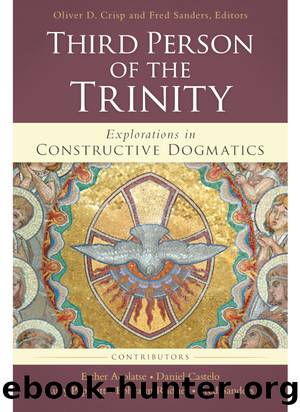The Third Person of the Trinity by Oliver D. Crisp

Author:Oliver D. Crisp
Language: eng
Format: epub
Publisher: Zondervan Academic
Published: 2020-10-02T00:00:00+00:00
THE QUESTION OF SPACE
The question regarding divine presence is perhaps uniquely raised when we consider the person of Jesus Christ and the mission of the Spirit. While the church has traditionally confessed that spacetime is a creation of the triune God, it has also affirmed that God is uniquely present on earth in the incarnation. But if Jesus Christ is the condition for the possibility of the knowledge of God as well as the perfect revelation of the Godhead, and Jesus Christ exists in space, does this not then require us to conceive of God in spatial terms? After all, it is in Jesus Christ and not in Peter or Pilate that God is uniquely present.2 Furthermore, how are we to make sense of notions of the temple and church as unique loci of the Holy Spiritâs presence? Scripture seems to describe the Holy Spirit as uniquely present in the church and believer (cf. 1 Cor 6:19; Eph 2:22), at least in a way that appears to be dissimilar to his presence in the rest of creation. In order to make sense of these doctrinal commitments, are we not required to appeal to spatial categories to articulate cogently how God can be more present or uniquely present in certain locations as opposed to others?
Robert Jenson, for his part, wonders if traditional accounts of divine omnipresence and timelessness have much to offer in response to these questions. He writes, âSo we may say that God transcends space, meaning perhaps that if he is present in one place he is not necessarily absent from any other. But this tells us very little about Godâs actual relation to space, certainly far from enough to form any decisive part of the distinction between Creator and creature.â3 Jenson worries that such interpretations either completely divorce God from the created order or subsume the world within the divine essence in a way that obliterates creaturely integrity. Instead, Jenson proposes that we reconstruct our understanding of the Creatorâs relationship to creation so as to avoid obfuscating the distinctiveness of creation. âFor God to create is for him to open a place in his triune life for others than the three whose mutual life he is. . . . He makes room, and that act is the event of creation. If creation is Godâs making room in himself, then God must be roomy.â4 This room or space is a âconversational space,â since the triune persons of the Godhead and creation itself are constituted by a communal conversation.5 Consequently, time, and by extension space, are not things that differentiate the Creator and creature; they are that which the Creator shares in common with his creature.
For Jenson, then, the Spirit is present within creation as its liberator, freeing it for a future life with God.6 As it relates to the questions of the believer and the church, Jenson argues that the Spirit is present within the ecclesial community as its spiritâthat is, he is its animating principle and the center of its polity.
Download
This site does not store any files on its server. We only index and link to content provided by other sites. Please contact the content providers to delete copyright contents if any and email us, we'll remove relevant links or contents immediately.
Christian Ethics by Wilkens Steve;(860)
Christian Ethics for a Digital Society by Kate Ott(779)
Fearfully and Wonderfully Made by Philip Yancey & Paul Brand(771)
God and the Multiverse by Victor J. Stenger(676)
Numbers by Ronald B. Allen(639)
How to Read Slowly by James W. Sire(616)
Christian Ethics: An Introduction to Biblical Moral Reasoning by Wayne Grudem(598)
The City of God by Saint Augustine & Marcus Dods(591)
Monastic Archaeology by Unknown(568)
Morality by Jonathan Sacks(566)
The Technological System by Jacques Ellul(549)
Amish Grace by Donald B. Kraybill & Nolt Steven M. & Weaver-Zercher David L(535)
Death of the Doctor by Unknown(526)
The Disabled Church by Rebecca F. Spurrier;(523)
Jesus: A New Vision by Whitley Strieber(522)
Children of Lucifer; The Origins of Modern Religious Satanism by Ruben van Luijk(513)
Critical Writings by Joyce James;(503)
Redeeming Sociology by Vern S. Poythress(488)
The Church in the Early Middle Ages by G.R. Evans(477)
